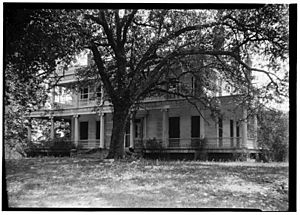Henrietta Wood facts for kids
Quick facts for kids
Henrietta Wood
|
|
|---|---|
| Born | Between 1818 and 1820 Kentucky, U.S.
|
| Died | 1912 Chicago, Illinois, U.S.
|
| Known for | Largest verdict awarded for slavery reparations in the United States |
| Children | 1 son |
Henrietta Wood (born around 1819 – died 1912) was an American woman who was once enslaved. She won the largest amount of money ever given in the United States as a form of reparation for slavery. Henrietta was born into slavery in Kentucky. She was later freed as an adult, but then she was sadly kidnapped and sold back into slavery. After the American Civil War ended, Henrietta successfully sued the person who kidnapped her and won money for the harm done to her.
Contents
Henrietta Wood's Life Story
Henrietta Wood was born into slavery in northern Kentucky sometime between 1818 and 1820. She lived on a farm owned by the Tousey family. After Moses Tousey died in 1834, Henrietta was sold to Henry Forsyth, a merchant in Louisville, for $700. She worked in his home.
She was sold again to William Cirode, another merchant in Louisville, Kentucky. Cirode was from France and took Henrietta to New Orleans. When Cirode went back to France in 1844, his wife, Jane Cirode, brought Henrietta to Cincinnati in Ohio. Ohio was a free state, meaning slavery was not allowed there. In 1848, Jane Cirode officially registered Henrietta as a free woman. For the next few years, Henrietta worked as a domestic worker (someone who helps with housework) in the Cincinnati area.
Kidnapped and Re-enslaved
In 1853, William Cirode's daughter, Josephine White, and her husband, Robert White, decided to try and make money by capturing Henrietta again. They hired Zebulon Ward, a deputy sheriff from Covington, Kentucky, to kidnap her and sell her back into slavery. Ward worked with Henrietta's employer to trick her into going to the Kentucky side of the Ohio River. There, they captured her.
Henrietta was then held in a slave pen (a place where enslaved people were kept before being sold) in Lexington, Kentucky for a year. At that time, a law called the Fugitive Slave Act of 1850 meant that Henrietta could not have a trial or speak for herself in court. However, a kind innkeeper whom Henrietta had met in Kentucky filed a lawsuit to help her. The lawsuit lasted two years but was not successful. This was because the papers proving Henrietta was free had been burned in a courthouse fire in Cincinnati in 1849.
After the lawsuit ended, Henrietta was taken to Natchez, Mississippi, in 1855. She was sold to Gerard Brandon, whose father had been the governor of Mississippi. Henrietta was forced to work very hard in the cotton fields and in the house on Brandon's plantations. During this time, she gave birth to her son, Arthur.
When the Union Army arrived to free enslaved people at the end of the American Civil War, Brandon tried to escape by moving his enslaved people to Texas. Henrietta remained enslaved to him until 1869. She was finally freed when she signed a work contract with the Brandon family. Soon after, she returned to the Cincinnati area with her son.
Winning Her Reparations Trial
In 1870, Henrietta Wood began a legal process to sue Zebulon Ward, the man who kidnapped her. The trial, called Wood v. Ward, took place in 1878 in a federal court in Cincinnati. Judge Philip Swing was in charge of the trial.
Henrietta and her lawyer, Harvey Myers, asked for $20,000 as restitution (money paid to make up for a wrong). The jury decided to award her $2,500, which she received in 1879. This amount is equal to about $65,000 in 2019 money. It remains the largest amount ever given as a payment for slavery reparations in the United States. Her case was supported by a writer named Lafcadio Hearn from The Cincinnati Commercial newspaper.
Later Life and Legacy
After winning her trial, Henrietta Wood moved to Chicago to live with her son, Arthur H. Simms. She used the money she won to help pay for him to attend Union College of Law. This school is now known as Northwestern University Pritzker School of Law. Arthur became a lawyer and had a long career in Chicago during the first half of the 1900s.
Even though Henrietta's trial was successful and received national news coverage at the time, it did not lead to many other similar cases. Her story was largely forgotten for many years. However, in 2019, W. Caleb McDaniel, a history professor at Rice University, found old court records and archives. He used them to research and write a book about Henrietta's life called Sweet Taste of Liberty: A True Story of Slavery and Restitution. This book won the 2020 Pulitzer Prize for history.
 | Emma Amos |
 | Edward Mitchell Bannister |
 | Larry D. Alexander |
 | Ernie Barnes |


